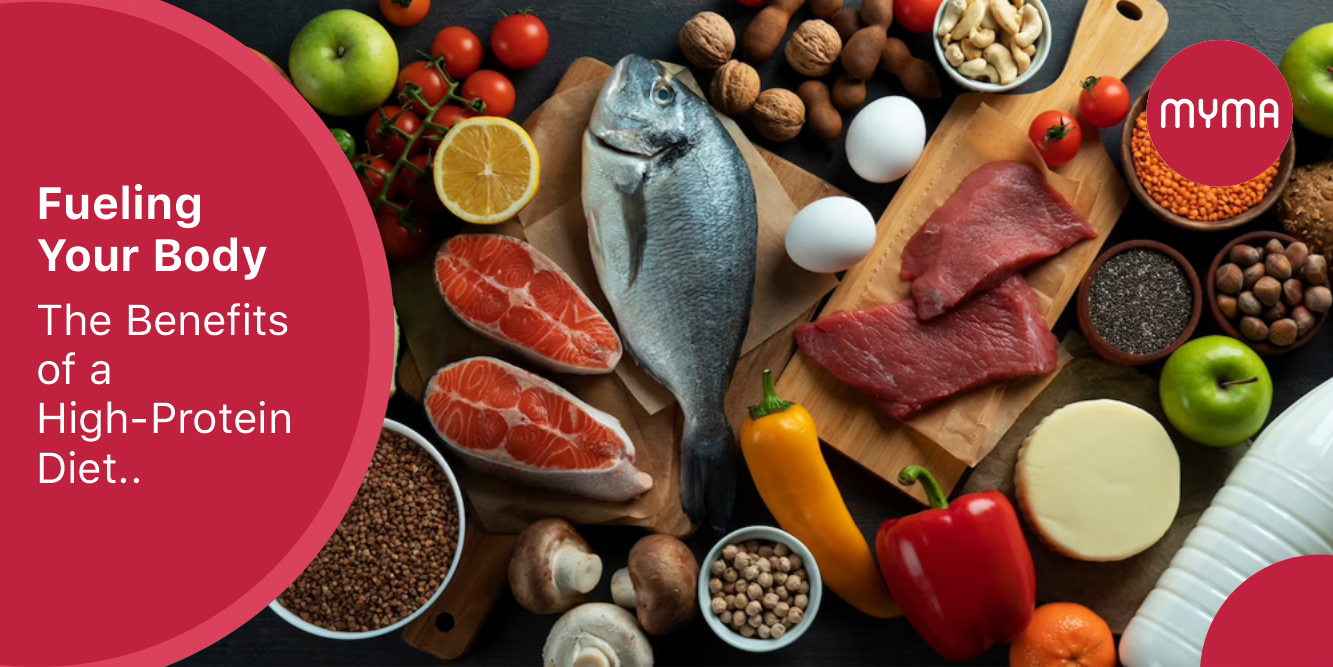Eating a healthy and balanced diet is key to maintaining good health. One important aspect of a balanced diet is consuming an adequate amount of protein. Protein plays a crucial role in building and repairing tissues in the body, as well as supporting a healthy immune system. In this blog post, we’ll explore the benefits of eating a high-protein diet and provide some tips for incorporating more protein into your diet.
1. What is a high-protein diet?
A high-protein diet is one that consists of a higher percentage of calories from protein compared to other macronutrients such as carbohydrates and fats. A typical high-protein diet may consist of lean meats, poultry, fish, eggs, dairy products, legumes, nuts, and seeds. The amount of protein needed in a high-protein diet will vary depending on factors such as age, gender, and activity level.
2.Benefits of a high-protein diet
A high-protein diet has numerous benefits, including:
- Increased muscle mass and strength: Protein is essential for building and repairing muscle tissues. Consuming a high-protein diet can help increase muscle mass and strength, particularly when combined with regular exercise.
- Weight loss: Protein is known to be more satiating than carbohydrates and fats, which can help reduce overall calorie intake and lead to weight loss.
- Improved bone health: Protein is necessary for building and maintaining strong bones.
- Lowered blood pressure: Some studies suggest that a high-protein diet may help lower blood pressure levels.
- Reduced risk of heart disease: Eating a high-protein diet may lower the risk of heart disease by reducing triglycerides and increasing levels of HDL cholesterol.
3.How to incorporate more protein into your diet
Incorporating more protein into your diet can be easier than you think. Here are some tips:
- Start your day with a high-protein breakfast: Opt for protein-rich foods such as eggs, Greek yogurt, or a protein smoothie to kick-start your day.
- Choose lean sources of protein: When selecting protein sources, opt for lean meats such as chicken or turkey, fish, or plant-based proteins such as legumes and tofu.
- Snack on protein-rich foods: Nuts, seeds, and protein bars are convenient and portable snack options that are also high in protein.
- Include protein in every meal: Make sure to include a source of protein in each of your meals, whether it’s through lean meats, fish, eggs, or plant-based proteins.
- Use protein supplements: Protein powders can be a convenient and easy way to add more protein to your diet, particularly for those with busy lifestyles or limited access to protein-rich foods.
4. Potential drawbacks of a high-protein diet
While a high-protein diet has numerous benefits, it’s important to note that there are some potential drawbacks as well. Consuming too much protein can lead to:
- Dehydration: Protein metabolism requires water, so consuming large amounts of protein without adequate hydration can lead to dehydration.
- Kidney damage: Some studies suggest that a high-protein diet may increase the risk of kidney damage, particularly in those with pre-existing kidney issues.
- Increased risk of certain cancers: Some studies have found a link between a high-protein diet and an increased risk of certain cancers such as colon cancer.
5. How much protein do you need?
The amount of protein needed in a high-protein diet will vary depending on factors such as age, gender, and activity level. Generally, it’s recommended that adults consume between 0.8-1.0 grams of protein per kilogram of body weight. However, for those looking to increase muscle mass or engage in regular strength training, it may be beneficial to consume more protein
6. Protein for Weight Loss
High-protein diets have been shown to aid in weight loss. Protein has a satiating effect, which means it can help you feel fuller for longer periods of time. In addition, protein can increase your metabolic rate, which means you burn more calories at rest. By increasing your protein intake, you may be able to reduce your calorie intake without feeling hungry.
7. Protein for Building Muscle
Protein is essential for building and repairing muscle tissue. This is why it’s important for athletes and bodybuilders to consume adequate amounts of protein to support muscle growth and recovery. High-protein diets may also help prevent muscle loss during weight loss or aging.
8.Conclusion
In conclusion, a high-protein diet can offer many benefits for overall health and well-being. It can help with weight loss, muscle growth and repair, and may even lower blood pressure and cholesterol levels. However, it’s important to remember that balance is key. It’s essential to consume a variety of foods to ensure you’re getting all the nutrients your body needs. Consider adding more high-protein foods to your diet, such as lean meats, poultry, fish, beans, and nuts, but don’t forget about fruits, vegetables, and whole grains. By making small changes to your diet, you can reap the benefits of a high-protein diet without sacrificing variety and balance.
Myma… Ghar jaisa nahi, Ghar ka khana!





